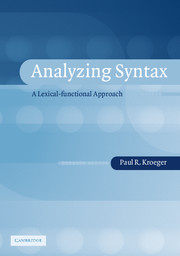Book contents
- Frontmatter
- Contents
- Preface and acknowledgments
- List of abbreviations
- 1 Three aspects of syntactic structure
- 2 Identifying constituents and categories
- 3 Passives, applicatives, and “Dative Shift”
- 4 Reflexives
- 5 Control
- 6 Pragmatic functions: topic and focus
- 7 Filler–gap dependencies and relativization
- 8 Causative constructions
- 9 Serial verbs and related issues
- 10 “Quirky case” and subjecthood
- 11 Syntactic ergativity
- References
- General index
- Language index
11 - Syntactic ergativity
Published online by Cambridge University Press: 05 June 2012
- Frontmatter
- Contents
- Preface and acknowledgments
- List of abbreviations
- 1 Three aspects of syntactic structure
- 2 Identifying constituents and categories
- 3 Passives, applicatives, and “Dative Shift”
- 4 Reflexives
- 5 Control
- 6 Pragmatic functions: topic and focus
- 7 Filler–gap dependencies and relativization
- 8 Causative constructions
- 9 Serial verbs and related issues
- 10 “Quirky case” and subjecthood
- 11 Syntactic ergativity
- References
- General index
- Language index
Summary
In chapter 10 we saw that case and agreement markers are not always in a one-to-one correspondence with grammatical relations. For example, we discussed a number of languages in which certain verbs require special case marking for their subjects or objects. In other languages, the marking of subjects depends on the transitivity of the clause: transitive subjects are marked one way, while intransitive subjects are marked another way. When, as is frequently true for such languages, intransitive subjects are marked in the same way as transitive objects, we say that the language is Ergative.
Ergativity in case or agreement systems is not uncommon among the world's languages. More rarely, however, we encounter languages in which the kind of subjecthood tests discussed in chapter 10 reveal an “ergative” pattern in the syntax. This “syntactic ergativity” will be the main focus of this chapter. We will suggest that syntactically ergative languages differ from other, more familiar, languages in their pattern of linking grammatical relations to semantic roles. But first, let us review the properties of a simple ergative case system.
Morphological ergativity
As we saw in the preceding chapter, the subject of a German clause normally takes nominative case. This is true whether the clause is transitive, as in (1a), or intransitive, as in (1b). Direct objects take a different case marker, namely the accusative (1c).
- Type
- Chapter
- Information
- Analyzing SyntaxA Lexical-Functional Approach, pp. 280 - 309Publisher: Cambridge University PressPrint publication year: 2004



